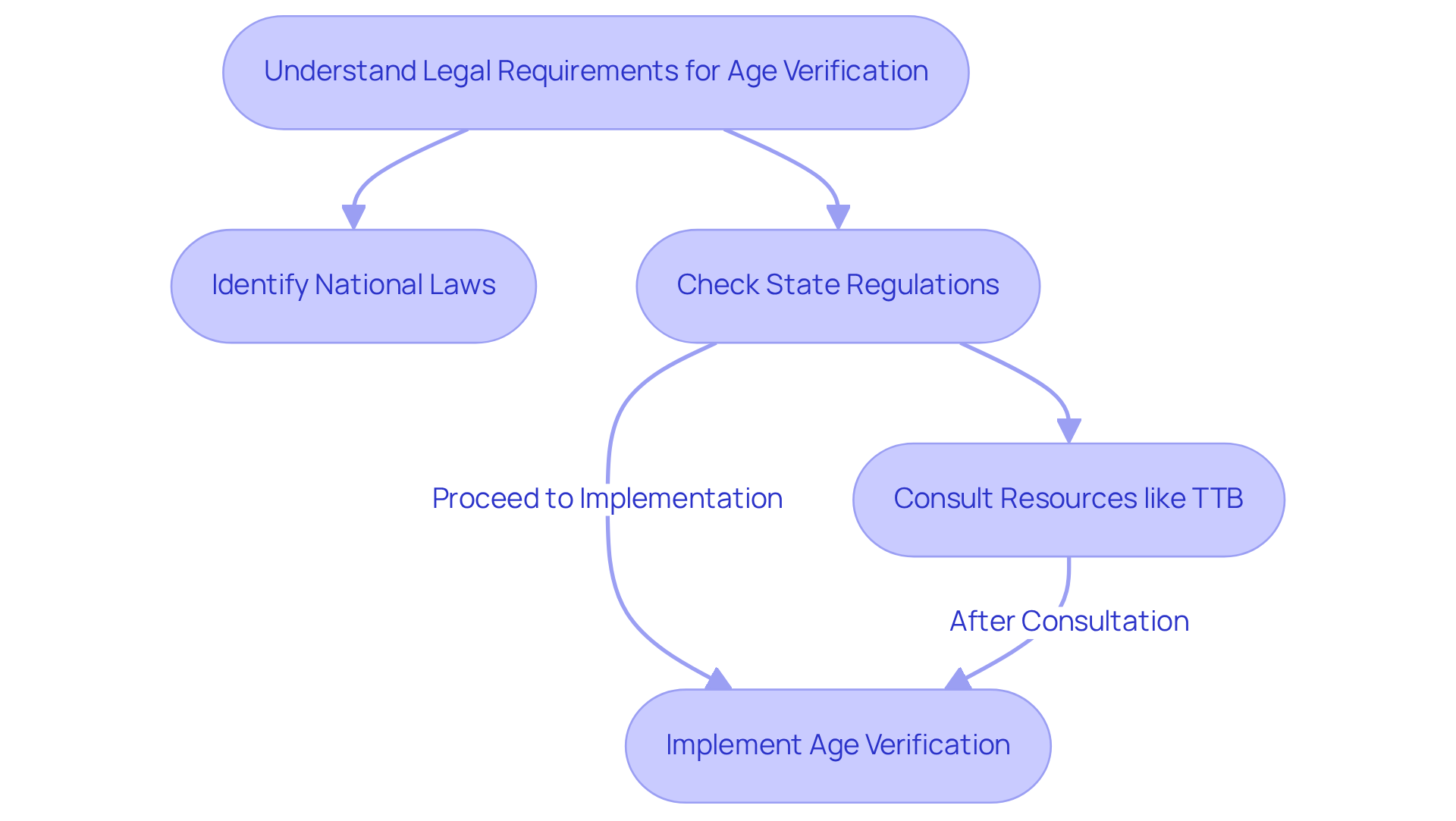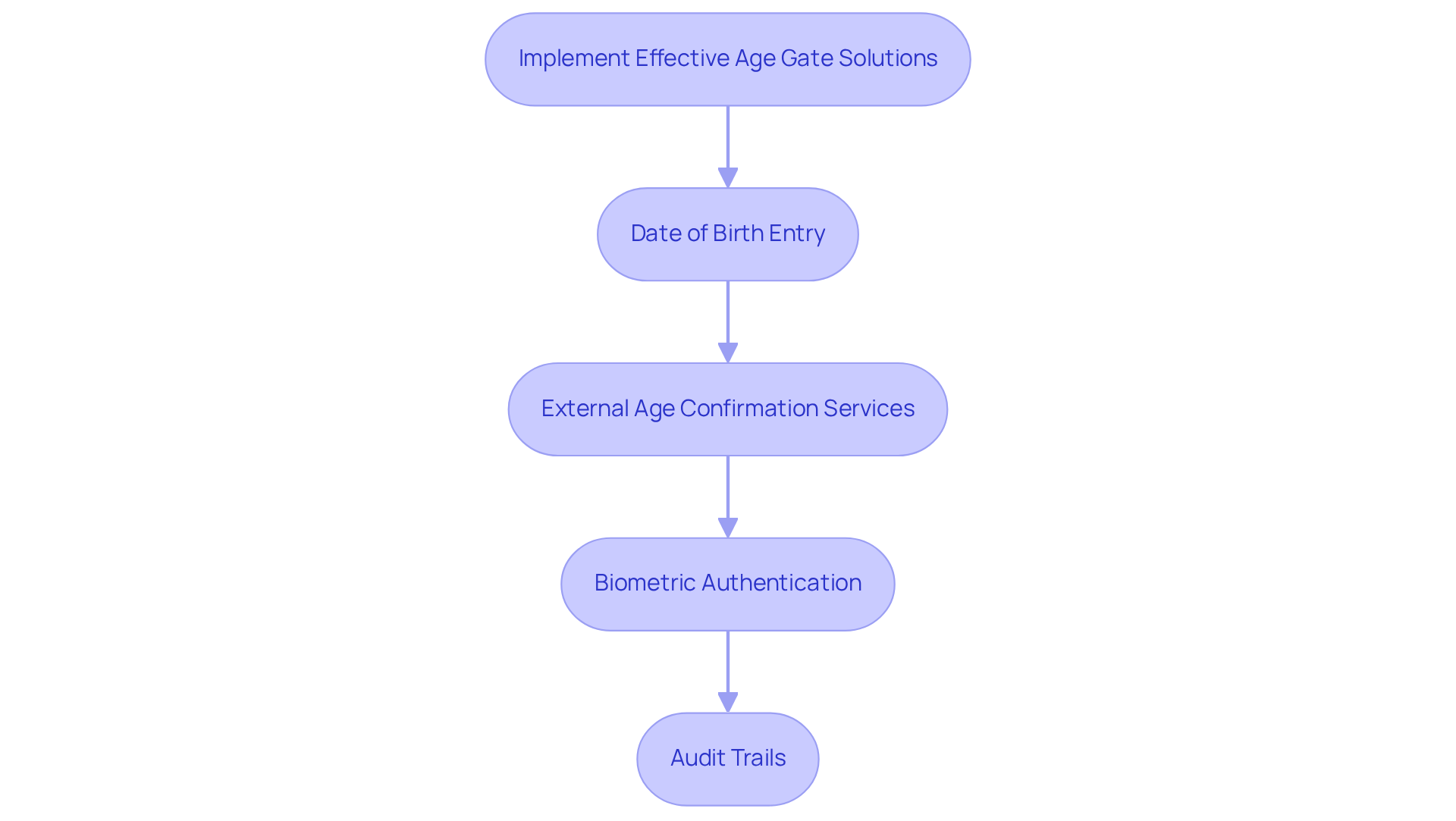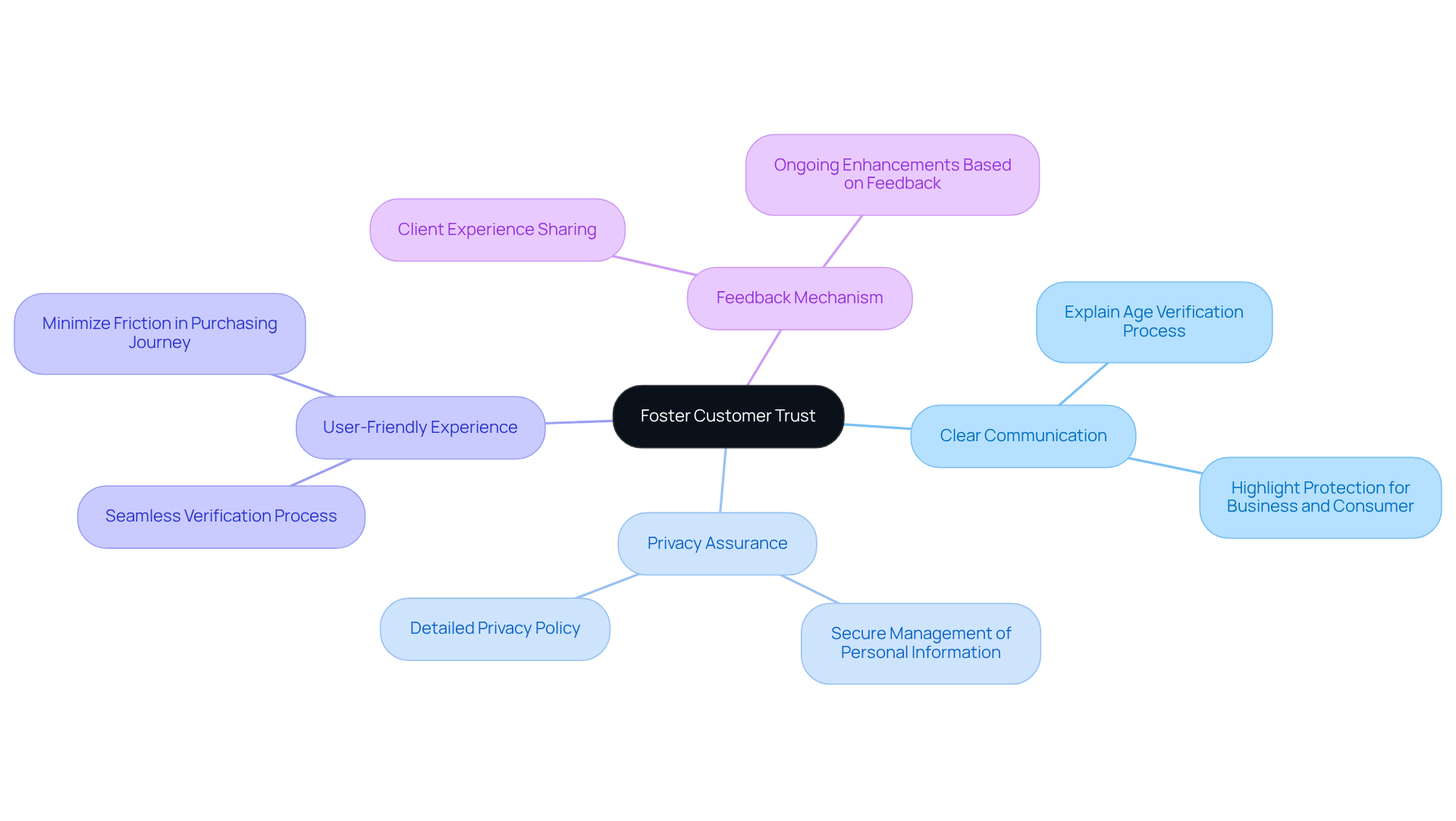Overview
Best practices for age verification on alcohol websites are critical in today’s regulatory landscape.
Understanding legal requirements is paramount, as compliance with local laws protects businesses from potential liabilities.
Implementing effective age gate solutions, such as date of birth entry and biometric authentication, ensures that only eligible consumers access age-restricted products.
Furthermore, fostering customer trust through transparent practices is essential.
Clear communication regarding privacy assurance and the verification process not only builds loyalty but also mitigates the risk of underage sales.
By prioritizing these strategies, businesses can create a secure environment that respects legal obligations while enhancing customer relationships.
Introduction
The rise of e-commerce has fundamentally transformed the landscape of alcohol sales, rendering age verification more critical than ever. For businesses navigating this evolving space, a comprehensive understanding of legal requirements and the implementation of effective practices can distinguish between compliance and costly penalties.
But how can companies ensure they not only meet these regulations but also cultivate trust with their customers? This article delves into best practices for age verification on alcohol websites, offering insights into legal compliance, effective age gate solutions, and strategies designed to foster transparency and enhance customer loyalty.
Understand Legal Requirements for Age Verification
Before implementing any age verification for alcohol websites, it is imperative to understand the legal requirements governing alcohol sales in your jurisdiction. In the United States, the National Minimum Drinking Age Act stipulates that individuals must be at least 21 years old to purchase alcohol. Furthermore, various states may impose stricter regulations. For instance, some states require that age confirmation occurs at both the point of sale and delivery. Familiarizing yourself with local laws and ensuring that your age verification for alcohol websites complies with these regulations is crucial to avoid penalties and maintain compliance.
Resources such as the Alcohol and Tobacco Tax and Trade Bureau (TTB) and state alcohol control boards offer invaluable information regarding the specific requirements applicable to your business. Regularly reviewing these regulations is essential, as they can change frequently, particularly with the rise of e-commerce in the alcohol industry. Staying informed not only protects your business but also reinforces your .

Implement Effective Age Gate Solutions
To effectively execute age verification for alcohol websites, it is essential to employ a combination of digital age gate solutions that not only ensure compliance but also enhance customer trust. Consider the following methods:
- Date of Birth Entry: Mandate individuals to enter their date of birth at the outset of the purchasing process. A user-friendly interface, potentially utilizing dropdown menus for day, month, and year, can significantly minimize errors and streamline the experience.
- External Age Confirmation Services: Leverage external age confirmation services that verify an individual's age through various methods, including ID scanning or database checks. This approach adds an extra layer of security and compliance, reinforcing your commitment to responsible sales.
- Biometric Authentication: For a more sophisticated solution, explore biometric authentication methods such as facial recognition or fingerprint scanning. These technologies provide a high level of assurance regarding a customer's age, aligning with industry best practices.
- Audit Trails: Maintain comprehensive records of age checks and their outcomes. This practice not only supports regulatory adherence but also provides valuable insights that can enhance the validation process over time.
By implementing these solutions, businesses can establish a robust age verification for alcohol websites system that mitigates the risk of underage sales while fostering client trust. Are you ready to take the necessary steps to enhance your age verification processes?

Foster Customer Trust Through Transparent Practices
Clarity in age verification for alcohol websites is essential for significantly boosting customer trust and loyalty. To foster this trust, consider the following strategies:
- Clear communication involves clearly conveying your age verification for alcohol websites process on your site. Use straightforward language to explain the necessity of age verification for alcohol websites and how it protects both the business and the consumer.
- Privacy Assurance: Assure clients that their personal information will be managed securely and in compliance with privacy laws. Provide a detailed privacy policy outlining how their data will be used and safeguarded.
- User-Friendly Experience: Ensure that the age verification for alcohol websites procedure is seamless, avoiding unnecessary friction in the purchasing journey. A complex or prolonged confirmation process can deter buyers from completing their transactions.
- Feedback Mechanism: Implement a feedback system that allows clients to share their experiences with the age verification for alcohol websites process. Utilize this feedback to make ongoing enhancements, demonstrating your appreciation for client input.
By adopting these transparent practices, businesses can cultivate a loyal customer base that values their commitment to responsible sales and compliance.

Conclusion
Implementing effective age verification on alcohol websites is not merely a regulatory requirement; it is a crucial step in establishing a responsible and trustworthy online business. By comprehensively understanding the legal landscape, employing robust age gate solutions, and fostering transparent practices, businesses can adeptly navigate the complexities of age verification, ensuring compliance while enhancing customer trust.
Key strategies include:
- Familiarizing oneself with local laws to avoid penalties
- Utilizing diverse verification methods such as date of birth entry and biometric authentication
- Maintaining transparency with customers regarding data usage and security
These practices not only protect the business but also instill confidence among consumers, reinforcing a commitment to responsible sales.
As the landscape of online alcohol sales continues to evolve, prioritizing age verification becomes fundamental to business operations. Embracing these best practices safeguards against underage sales and cultivates a loyal customer base that values integrity and transparency. Proactively addressing age verification can significantly contribute to a safer and more responsible alcohol e-commerce environment.
Frequently Asked Questions
What is the legal age requirement for purchasing alcohol in the United States?
Individuals must be at least 21 years old to purchase alcohol in the United States, as stipulated by the National Minimum Drinking Age Act.
Do all states have the same age verification requirements for alcohol sales?
No, various states may impose stricter regulations, including requirements for age confirmation at both the point of sale and delivery.
Why is it important to understand local laws regarding age verification for alcohol websites?
Understanding local laws is crucial to ensure compliance with regulations, avoid penalties, and maintain responsible practices in alcohol sales.
Where can I find information about the specific age verification requirements for my business?
Resources such as the Alcohol and Tobacco Tax and Trade Bureau (TTB) and state alcohol control boards provide valuable information regarding the specific requirements applicable to your business.
How often should I review the regulations related to age verification for alcohol sales?
It is essential to regularly review these regulations, as they can change frequently, especially with the rise of e-commerce in the alcohol industry.




